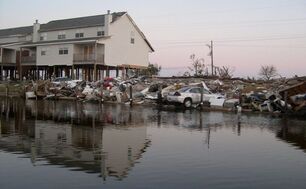|
Climate change does not impact everyone in the same way. Certain communities, especially historically marginalized or underserved communities, bear a disproportionate burden when it comes to experiencing the impacts of climate change. The adverse impacts of the changing climate are not equitably dispersed. Low-income communities, people of color, indigenous people, people with disabilities, older or very young people, and women can all be more susceptible to the risks posed by climate impacts. |
In the United States, people of color are found to be particularly more vulnerable to heatwaves, extreme weather events, and environmental degradation. Photo from Water Mission; Hurricane Katrina, 2005
|
REsources
Read a paper by the Yale Project on Climate Change: "Race, Ethnicity, and Public Responses to Climate Change."
Read a blog post from the Princeton Student Climate Initiative: Racial Disparities and Climate Change.
Learn about how the UN defines climate justice here.
Here, Yale Climate Connections explains climate justice.
Read about the link between Coronavirus death rates and environmental racism here.
Listen to marine biologist, Ayana Elizabeth Johnson, discuss the link between climate change and racial justice here, or read her op-ed here.
Read a blog post from the Princeton Student Climate Initiative: Racial Disparities and Climate Change.
Learn about how the UN defines climate justice here.
Here, Yale Climate Connections explains climate justice.
Read about the link between Coronavirus death rates and environmental racism here.
Listen to marine biologist, Ayana Elizabeth Johnson, discuss the link between climate change and racial justice here, or read her op-ed here.




